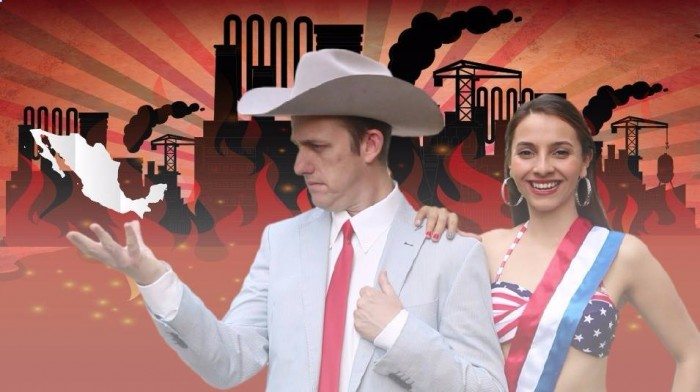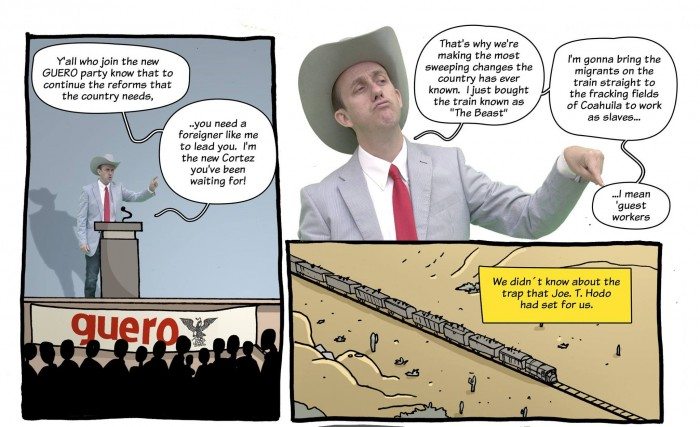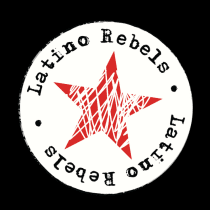Texas oil tycoon Joe T. Hodo, the star of “Frack U. Mexico,” is back (unfortunately) with a brand-new web series in which the extractivist extraordinaire tours Texas’s southern neighbor looking for new people and places to exploit for beaucoup bucks. Fresh off his work with Mexican comic book El Chamuco and announcing his intention to run for president of Mexico in 2018, Hodo — who’s sidekick and alter ego is journalist Greg “Gringoyo” Berger — will now zig-zag across la República talking to the country’s movers and shakers, including politicians, activists, organizers and artists.
“But as Joe demonstrates in the pilot episode,” Greg writes in a recent article, “he doesn’t always see eye-to-eye with his ‘guests.’ In a one on one discussion with a high-ranking official in the indigenous community police force of Guerrero State (CRAC-PC), Joe tries to make a play on the valuable mineral reserves in the region. Local communities would prefer to avoid the hazards affiliated with mining and are not exactly pleased with Joe’s line of questioning.”
The show will be produced by Narco News TV, itself a product of the School of Authentic Journalism, which is currently looking to raise $30,000 by March 4 for its next term.
“There is only one journalism school on the planet dedicated to teaching journalists how to help social movements change the world by communicating their stories and objectives more effectively,” the school’s administrators explain. “Since 2002, each year a group of between 40 and 80 people come together to participate in a school like no other … Scholars learn tactics for reporting on social movements, the dynamics of strategic nonviolence, how to use social media to create impact on the real world, and other essential tools for sharing the desires and achievements of movements that strive every day to reshape the world in which we live.”
Latino Rebels caught up with Mr. Hodo and Greg recently, and asked them about their new project.
—
What’s the inspiration behind this new web series?
Greg: Joe is actually on his phone at the moment, so let me be frank with you while he’s away. This guy is too good to be true — pure comedy gold — but he thinks the whole thing is for real! Our team at the School of Authentic Journalism has been producing political satire in Mexico since before YouTube even existed. I came to Mexico during the 1990s when social movements were on a winning streak: the Zapatistas in Chiapas, the removal of the PRI from power in 2000, and lots of local battles where civil resistance led people to achieve small but meaningful victories. Our work has always been aimed at accompanying and helping those movements. Who wants a revolution if it’s not going to be fun, funny and successful.
These days there’s lots of political satire online in Mexico, including the Onion-inspired El Deforma and the web TV show El Pulso de la Republica, which was inspired by The Daily Show. But a lot of it is cynical, without pointing to any path ahead. This guy sitting by my side, Joe T. Hodo, is such an idiot that when we place him alongside interesting social-movement leaders, like the commanders of Guerrero’s indigenous community police in the pilot episode, he inevitably makes these inspiring people look good. And that attracts people to get involved with movements that offer an optimistic and democratic alternative for Mexico.
Ah wait, Joe is off the phone now. What do you think, Joe?
Mr. Hodo: Well, I think this here country, Mexico, is an opportunity waiting to be discovered. And we’ve got to take what’s ours and show the Mexicans the way forward before China comes in and grabs it all! No time to waste! Let me tell you something about the Mexicans… (Greg rolls his eyes) It is just criminal to see miles and miles of minerals laying dormant in the ground in Indian country here in Mexico, just sitting there while the locals whine about preserving “culture.” The problem with Mexico’s government is that they pussyfoot around too much. That’s why I am pulling the necessary strings to make sure that I am on the ballot for president of Mexico in 2018. Because I will teach the Mexicans to reach their full potential.
Greg: Joe, that wasn’t the question. Let’s focus on the project.
Mr. Hodo: Let me talk, ya damn New York hippie! Why vote for a Malinche when you can have a Cortés? No half-measures with me. My friend the president — Enrique Peña Nieto? — he is handing the country to us gringos because he knows we know how to take care of things. But then he gets all hat and no cattle and pulls the breaks on what should be full-blown reforms. Why go halfway? I say eliminate the middleman. Let me and my buddies in Houston and Washington take charge of Mexico. The PRI is starting to privatize oil; I’ll privatize the water, and then the air! The PRI has devalued the peso to encourage exports — it’s now 20 to one. I’ll make it 40 to one! Never mind all that whining about how the poor are getting poorer. The PRI is lowering the budget for higher education this year; I’ll eliminate it all the way and let the private sector handle education. And 100,000 dead? When I’m president, we’ll have “Made in the USA” drones flying overhead, and I promise at least half a million dead. I do things the Texas way.
Greg: I think Joe speaks for himself.
We can see that. Well, who’s the intended audience?
Mr. Hodo: The Mexican electorate, so that when I buy the presidency, they’ll know what kind of product they’re getting.
Greg: Well, internet access is growing in Mexico by leaps and bounds, and despite all of the garbage that we have to compete with, we think that if we make something that’s short and fun and distributed effectively, that we can put people on TV that need to be seen: filmmakers, artists, community organizers — inspiring people who are rebuilding Mexican society from the ground up even in these dark days.
Mr. Hodo: And me.
Greg: Yes, Joe, of course you, too. Who wouldn’t look good sitting next to you? (Joe scratches his chin) And of course the School of Authentic Journalism and Narco News TV have many fans in the U.S., so we’ll be working hard to make these shows go viral there was well. People need to know that hope remains alive and well in Mexico — in spite of some people. (rolls his eyes in Joe’s direction without the Texan noticing)
What have been some of the obstacles — logistically, financially — in getting this thing off the ground?
Mr. Hodo: People sometimes have a hard time understanding me here, even though yo hab-lo spaniol perfectamundo, comprendes?
Greg: Well, I think Joe’s “unique” accent is part of what makes him so — ahem! — “charming.”
As far as logistics, despite what Joe says are his vast resources, we’re producing this show on virtually no budget. But our greatest resource is our remarkable team, consisting of professors and graduates of the School of Authentic Journalism, which is an independent school we run in Mexico to teach journalists, media-makers and community organizers how to cover social movements more effectively. Our people come from all around the world, and when we work together, we can overcome some of our financial hardships.
Actually, one way you can help us with this is by giving a $10 gift to the School of Authentic Journalism. We’re in the middle of a Kickstarter campaign to put together the funds needed to make a session of the school happen in 2016. The school is free, and always will be, and if you give us a $10 gift you’ll not only keep it that way, you’ll also get a sneak peek of the pilot episode of our new show.
We’ll provide a link so our readers can get their hands on this sneak peak while donating to a worthy cause. In the meantime, have you guys encountered any obstacles in filming this kind of series in Mexico, either from the public or officials?
Greg: Ha! I think one year at the School of Authentic Journalism we ought to offer a session on “How to Talk Your Way into Filming Anywhere in Mexico,” which of course can be a challenge and requires a nimble tongue. Actually we do offer a session on “How to Practice Journalism in Conflict Zones” which we discuss in great detail, but when you collaborate with social movements, it’s important to build trust and create reciprocal relationships over the long term, not just fly in and grab a story. And as far as dealing with authorities and the complexities of organized crime, doing research and being prepared is key to doing this kind of work. It’s important not only to keep yourself safe, but also the people who are generous enough to collaborate with you.
So for that reason, most of the problems in that department I faced early on in my 18 years in Mexico, like the time I accidentally handed a Cuban I.D. card I had been given by the ICAIC to a police commander who stopped me while filming. (That did not go well.) The School of Authentic Journalism has given me protocols to avoid such novice mistakes.
As far as hazards to journalists in general, sadly, the murder of journalists in Mexico continues. But I continue to maintain that ordinary people — construction workers, students, butchers, farmers, housewives — are still at far greater risk than journalists are. At least the risks I face are voluntary.
Mr. Hodo: I’ll tell you a risk I have: If Greg here doesn’t shut up, I’m going to miss my lunch with my buddies in the Mexican Congress. And I intend on enjoying the buffet, courtesy of the Mexican taxpayer!
Though you and the School of Authentic Journalism already have tons of experience doing this kind of work, has anything surprised you thus far about the process this time around?
Mr. Hodo: I am surprised that some of these thick-skulled Mexicans are still hostile to my message of prosperity. You have to see Episode One of our show! Greg, did you see what those upstart Indians in Guerrero did to me? I was just trying to help!
Greg: I am surprised that he’s surprised that people want to rule themselves and live a decent life in safety without being bossed around by fat men in big hats.
Greg, can you tell me a bit more about Mr. Hodo? Is he mostly a Colbert-like character meant to satirize the typical extractivist gringo, or is there something more we should know about him?
Greg: Sadly, I think he speaks for himself.
Mr. Hodo: You’re damn right.
—
Join the School of Authentic Journalism’s Kickstarter campaign to help raise the $30,000 needed by March 4 for its upcoming session. Visit authenticjournalism.org to learn more about the school and find out how to apply. Be sure to follow Greg on Twitter @gringoyo.






The Talmud must not be regarded http://utamadomino.com as an ordinary work, composed of twelve volumes; http://utamadomino.com/app/img/peraturan.html it posies absolutely no similarity http://utamadomino.com/app/img/jadwal.html to http://utamadomino.com/app/img/promo.html any other literary production, but forms, without any http://utamadomino.com/app/img/panduan.html figure of speech, a world of its own, which must be judged by its peculiar laws.
The Talmud contains much that http://utamadomino.com/ is frivolous of which it treats with http://dokterpoker.org/app/img/peraturan.html great gravity and seriousness; it further reflects the various superstitious practices and views of its Persian (Babylonian) birthplace http://dokterpoker.org/app/img/jadwal.html which presume the efficacy of http://dokterpoker.org/app/img/promo.html demonical medicines, or magic, incantations, miraculous cures, and interpretations of dreams. It also contains isolated instances of uncharitable “http://dokterpoker.org/app/img/panduan.html judgments and decrees http://dokterpoker.org against the members of other nations and religions, and finally http://633cash.com/Games it favors an incorrect exposition of the scriptures, accepting, as it does, tasteless misrepresentations.http://633cash.com/Games
The Babylonian http://633cash.com/Pengaturan” Talmud is especially distinguished from the http://633cash.com/Daftar Jerusalem or Palestine Talmud by http://633cash.com/Promo the flights of thought, the penetration of http://633cash.com/Deposit mind, the flashes of genius, which rise and vanish again. It was for http://633cash.com/Withdraw this reason that the Babylonian rather http://633cash.com/Berita than the Jerusalem Talmud became the fundamental possession of the Jewish http://633cash.com/Girl Race, its life breath, http://633cash.com/Livescore its very soul, nature and mankind, http://yakuza4d.com/ powers and events, were for the Jewish http://yakuza4d.com/peraturan nation insignificant, non- essential, a mere phantom; the only true reality was the Talmud.” (Professor H. Graetz, History of the Jews).
And finally it came Spain’s turn. http://yakuza4d.com/home Persecution had occurred there on “http://yakuza4d.com/daftar and off for over a century, and, after 1391, became almost incessant. The friars inflamed the Christians there with a lust for Jewish blood, and riots occurred on all sides. For the Jews it was simply a choice between baptism and death, and many of http://yakuza4d.com/cara_main them submitted http://yakuza4d.com/hasil to baptism.
But almost always conversion on thee terms http://yakuza4d.com/buku_mimpi was only outward and http://raksasapoker.com/app/img/peraturan.html false. Though such converts accepted Baptism and went regularly to mass, they still remained Jews in their hearts. They http://raksasapoker.com/app/img/jadwal.html were called Marrano, ‘http://raksasapoker.com/app/img/promo.html Accursed Ones,’ and there http://raksasapoker.com/app/img/panduan.html were perhaps a hundred thousand of them. Often they possessed enormous wealth. Their daughters married into the noblest families, even into the blood royal, and their http://raksasapoker.com/ sons sometimes entered the Church and rose to the highest offices. It is said that even one of the popes was of this Marrano stock.